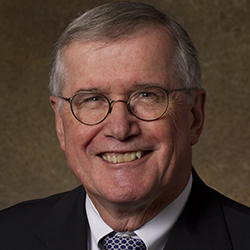Mark V. Pauly Ph.D.
 Bendheim Professor
Bendheim Professor
The Wharton School
University of Pennsylvania
Email: pauly@wharton.upenn.edu
Discipline: Economics
Expertise: Competition / Markets, Insurance
Investigator Award 
How Well Does Employment-Based Health Insurance Pool Risk?Award Year: 1995 Private employment-based insurance pools some of the risk of high medical care expenses across individuals. How well it achieves protection against risk is not well known, but belief that pooling is imperfect especially for employment-based coverage furnished by small groups supports many actual and proposed insurance regulations, reforms, tax advantages, and explicit subsidies. Dr. Pauly undertakes an in-depth analysis of what is currently known about pooling risk in general and for firms of different sizes and workers of different characteristics. New information is generated on the level of pooling and its variation across firms and industry. The impact of government intervention, such as state insurance regulations, tax subsidies, and ERISA are examined. Knowing how well the current system works and where it functions with different degrees of effectiveness is highly useful to the design of minimally intrusive and cost-effective regulations to improve the efficiency and equity of the market.
Background 
Mark V. Pauly is Bendheim Professor in the Health Care Management Department at the Wharton School of the University of Pennsylvania where he served as chair of the department. He received a Ph.D. in economics from the University of Virginia. He is professor of health care systems, insurance and risk management and business and public policy at the Wharton School and professor of economics in the School of Arts and Sciences at the University of Pennsylvania. He also serves as co-director of the Roy and and Diana Vagelows Program in Life Sciences and Management. Dr. Pauly is a former commissioner on the Physician Payment Review Commission and an active member of the Institute of Medicine. One of the nation's leading health economists, Dr. Pauly has made significant contributions to the fields of medical economics and health insurance. His classic study on the economics of moral hazard was the first to point out how health insurance coverage may affect patients' use of medical services. Subsequent work, both theoretical and empirical, has explored the impact of conventional insurance coverage on preventive care, on outpatient care, and on prescription drug use in managed care. In addition, he has explored the influences that determine whether insurance coverage is available and, through several cost effectiveness studies, the influence of medical care and health practices on health outcomes and cost. His interests in health policy deal with ways to reduce the number of uninsured through tax credits for public and private insurance, and appropriate design for Medicare in a budget-constrained environment. Dr. Pauly is a co-editor-in-chief of the International Journal of Health Care Finance and Economics and an advisory editor of the Journal of Risk and Uncertainty. He has served on Institute of Medicine panels on public accountability for health insurers under Medicare and on improving the financing of vaccines. In 2007, he received a Distinguished Investigator Award from AcademyHealth.
- Pauly, M. The Trade-Off Among Quality, Quantity, And Cost: How to Make ItÑIf We Must. Health Affairs, Apr 2011, 30(4): 4574-580.
- Burns, L.R., Pauly, M.V. Integrated Delivery Networks: A Detour on the Road to Integrated Health Care. Health Affairs, 2002, 21(4): 128-43.
- Pauly, M.V. Kenneth Arrow and the Changing Economics of Health Care. Forward. JHPPL, 2001, 26(5): 829-34.
- Pauly, M.V., Herring, B.J. An Efficient Employer Strategy for Dealing with Adverse Selection in Multiple-Plan Offerings: an MSA Example. J of Health Economics, 2000, 19(4): 513-28.
- Pauly, M., Nickel, A., Kunreuther, H. Guaranteed Renewability with Group Insurance. J of Risk and Uncertainty, 1998, 16(3): 211-21.
